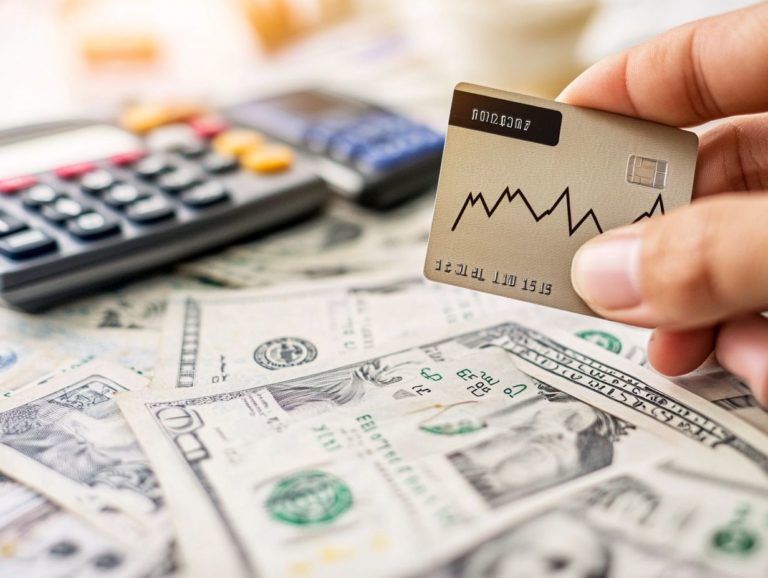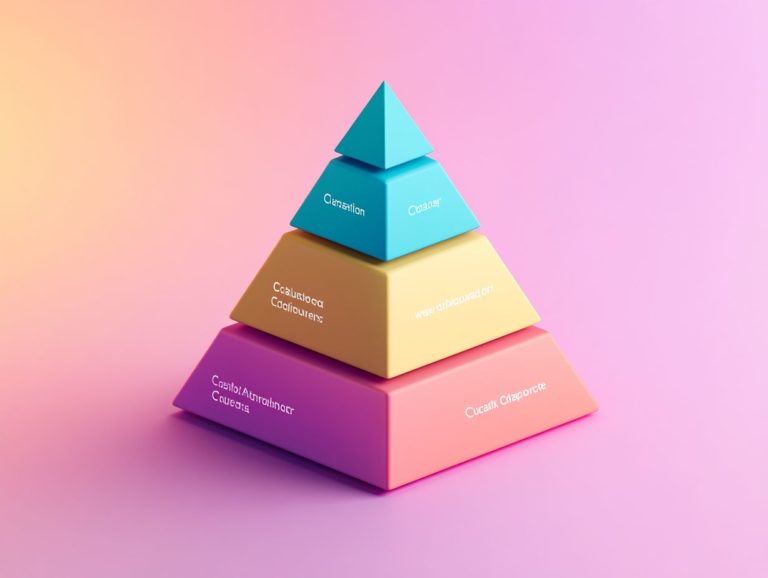What to Do If You Have No Credit History
Understanding your credit history is essential in today s financial landscape. It acts as a snapshot of your borrowing behavior and can significantly influence your ability to secure loans or credit cards.
But what if you find yourself without any credit history? Let s dive into why some people lack a credit record and how you can change that!
Explore alternative methods for establishing credit and discover how to cultivate good credit habits that pave the way for a secure financial future.
Contents
- Key Takeaways:
- Understanding Credit History
- Why You May Have No Credit History
- Common Reasons for Lack of Credit History
- The Impact of No Credit History
- Building Credit with No Credit History
- Alternative Credit Building Options
- Maintaining Good Credit Habits
- Frequently Asked Questions
- What to Do If You Have No Credit History?
- Why is Having No Credit History a Problem?
- Can I still get approved for a credit card if I have no credit history?
- Is it important to check my credit report if I have no credit history?
- How long does it take to build credit if I have no credit history?
- What mistakes should I avoid when trying to build credit with no credit history?
Key Takeaways:

- Having no credit history can make it difficult to obtain loans and credit.
- To build credit with no credit history, consider options such as rent and utility payments or secured credit cards.
- Maintaining good credit habits, like making payments on time and keeping balances low, is crucial for building and maintaining a positive credit history.
Understanding Credit History
Grasping the nuances of credit history is essential for anyone aiming to make informed financial decisions. It plays a pivotal role in shaping your credit score a number that shows how good you are at paying back borrowed money.
Your credit history weaves together various elements, including your payment patterns, the diversity of your credit accounts, and the duration of your credit journey. These are all meticulously reported by credit bureaus such as Experian, Equifax, and TransUnion.
By developing a thorough understanding of your credit history, you equip yourself to navigate the landscape of personal finance more adeptly. This knowledge unlocks financial opportunities while helping you sidestep common credit pitfalls.
What is Credit History?
Credit history serves as a detailed record of your borrowing and repayment activities. It offers a comprehensive glimpse into your creditworthiness, which is ultimately reflected in your credit score.
This history includes essential elements such as your payment history, showcasing whether your payments were made on time, and the types of credit accounts you hold. These could range from revolving credit like credit cards to installment loans such as car loans or mortgages.
Your credit reports contain crucial details like outstanding balances, credit limits, and inquiries made by lenders. Credit bureaus gather and maintain this data, ensuring that your reports are both accurate and current. This gives lenders the power to make well-informed decisions regarding your credit applications.
Why is it Important?
Your credit history is a crucial factor in determining your credit score, which directly influences your chances of securing loans and credit cards. This affects your overall loan eligibility and the interest rates you’ll be offered.
A robust credit history not only broadens your access to a diverse range of financial products but also enables you to secure loans at significantly lower interest rates. For example, someone with an excellent credit score might be offered a mortgage rate that s 1-2% lower than what someone with a poor credit history would receive. Over time, this can translate into substantial savings.
A solid credit background shapes your daily financial decisions. When renting an apartment, landlords often conduct credit checks. Better credit can result in lower premiums when purchasing insurance. Ultimately, maintaining a positive credit history is essential for unlocking various opportunities, influencing both your short-term choices and long-term financial well-being.
Why You May Have No Credit History
Navigating the financial landscape without a credit history, often termed as being credit invisible, can present a substantial obstacle. This lack of visibility can significantly impact your borrowing limits and diminish your access to various financial opportunities.
Common Reasons for Lack of Credit History
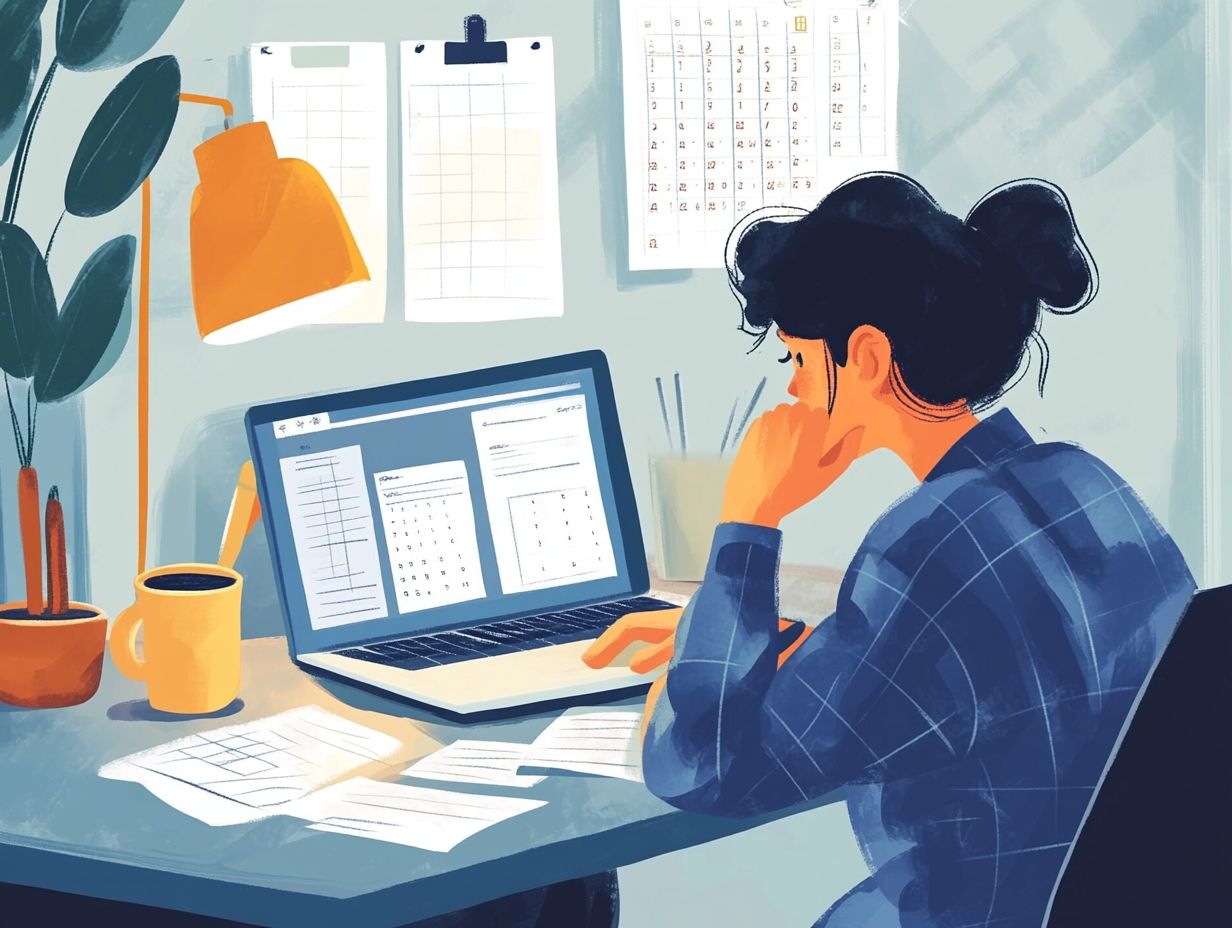
Common reasons for lacking a credit history often include being a young adult just starting out or a recent immigrant unfamiliar with the credit system. Both situations render individuals credit invisible.
Relying primarily on cash or debit transactions can severely limit your engagement with credit accounts. Many choose this route to maintain a budget free of debt or to sidestep interest charges. However, this strategy might inadvertently stifle your ability to build a solid credit profile.
If you ve never interacted with financial institutions whether due to a lack of awareness or accessibility you may find it challenging to establish any record of credit activity. These factors can profoundly impact your future financial decisions.
Having no credit history can make it hard to secure loans or qualify for credit cards, ultimately influencing opportunities for home ownership and employment.
The Impact of No Credit History
The absence of a credit history creates substantial challenges when it comes to securing loans and obtaining approval from lenders.
This limitation restricts your access to a range of financial opportunities that could enhance your economic prospects.
Difficulty Obtaining Loans and Credit
Individuals without a credit history often encounter significant challenges when attempting to secure loans. Lenders depend on credit scores to assess risk and approve applications.
The absence of a credit score creates additional hurdles. Lenders perceive these individuals as high-risk borrowers, leading to heightened scrutiny of their loan applications.
As a result, applications may face either elevated interest rates or outright denials. If you find yourself without a credit history, you might need to present alternative documentation like proof of income or employment history to illustrate your ability to repay the loan.
To successfully navigate this complex terrain, consider exploring alternatives like secured credit cards which require a cash deposit or credit-builder loans, which are designed to help you build credit. Additionally, enlisting a cosigner can enhance your chances of loan approval.
Building Credit with No Credit History
Building credit without a credit history is not just a dream; it s entirely achievable! You have several effective methods at your disposal, such as secured credit cards, credit builder loans, and becoming an authorized user on someone else’s credit account.
These avenues create a pathway for you to establish a robust credit score and set the foundation for your financial future.
Steps to Establish Credit
To establish credit, you can take several important steps:
- Apply for a secured credit card.
- Utilize a credit builder loan.
- Become an authorized user on a friend or family member’s account.
Each option offers unique benefits, but the secret to successful credit building lies in managing these accounts wisely. Once you obtain a secured credit card, make small, regular purchases and pay off the balance in full each month. This cultivates a positive payment history.
With a credit builder loan, consistency in making on-time payments builds your credit and showcases your financial reliability. If you choose to be an authorized user, ensure that the primary cardholder maintains a solid payment record. Their habits will reflect on your credit profile.
These practices significantly impact your credit scores, emphasizing that responsible payment behavior is the foundation of a robust credit history.
Alternative Credit Building Options
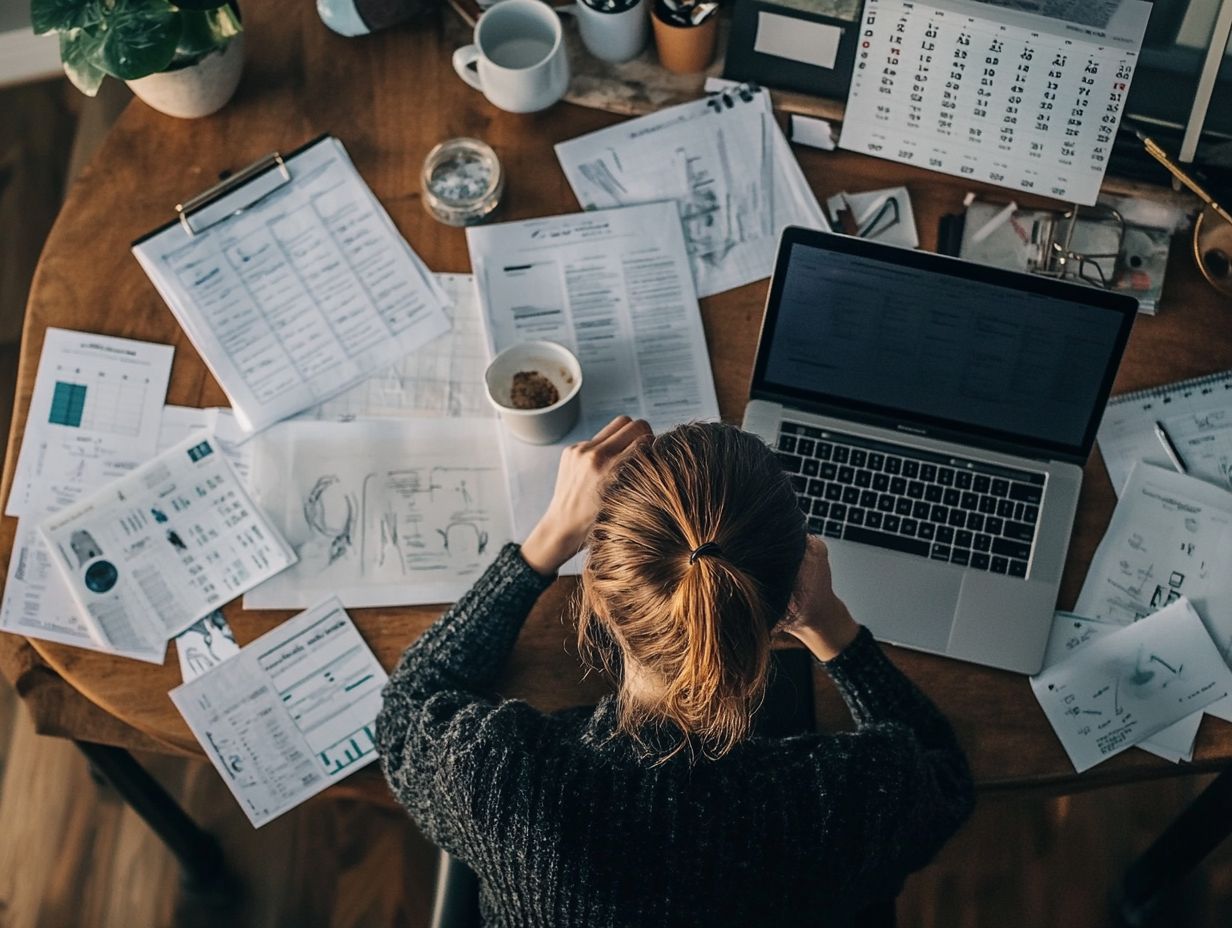
Alternative credit-building options present you with a distinctive opportunity to establish credit, especially if you lack a traditional credit history.
By leveraging recognized payments such as rent and utility bills, along with secured credit cards, you can effectively pave your way to a solid credit profile.
Using Rent and Utility Payments
Using rent and utility payments to build your credit is a smart and innovative approach. These regular expenses can be reported to credit reporting services, helping you establish a solid credit history.
Incorporating these essential payments into your credit profile creates a more comprehensive picture of your financial behavior. This strategy can enhance your credit score, especially for those who may not have a robust credit history, such as young adults or recent immigrants. It showcases your reliability in fulfilling financial obligations.
However, not all landlords or utility companies report to credit bureaus. Mismanaging these payments can negatively impact your credit score, so it s crucial to make consistent and timely payments.
Secured Credit Cards
Secured credit cards are an excellent tool for building credit. They require a cash deposit that acts as collateral, helping you establish a positive credit score through responsible usage.
Like traditional credit cards, they let you make purchases and pay bills, allowing you to manage your finances effectively. Once you make the cash deposit, your credit limit is set at that amount, encouraging you to exercise financial discipline.
Be aware of potential drawbacks, such as high fees and interest rates. Many secured cards report to the major credit bureaus, giving you the power to build or rebuild your credit score over time.
Making on-time payments helps you avoid penalties and maximizes your credit-building potential.
Maintaining Good Credit Habits
Maintaining good credit habits is crucial for a healthy credit score. It s all about embracing responsible credit management, ensuring a consistent payment history, and understanding how much credit you re using compared to your limit.
By prioritizing these elements, you set yourself up for financial success and stability.
Tips for Building and Maintaining Good Credit
Building and keeping good credit is all about smart choices! You need intentional strategies, including smart payment habits and regular credit monitoring.
Start by crafting a realistic budget that emphasizes timely bill payments. Using credit monitoring apps can provide valuable insights into your spending patterns and alert you to any fraudulent activities.
Understand the implications of credit inquiries. For example, multiple hard inquiries within a short timeframe can negatively impact your score.
Aim to keep your credit utilization below 30% and ensure that older accounts remain active. This approach will help you develop a stronger overall credit history.
Frequently Asked Questions
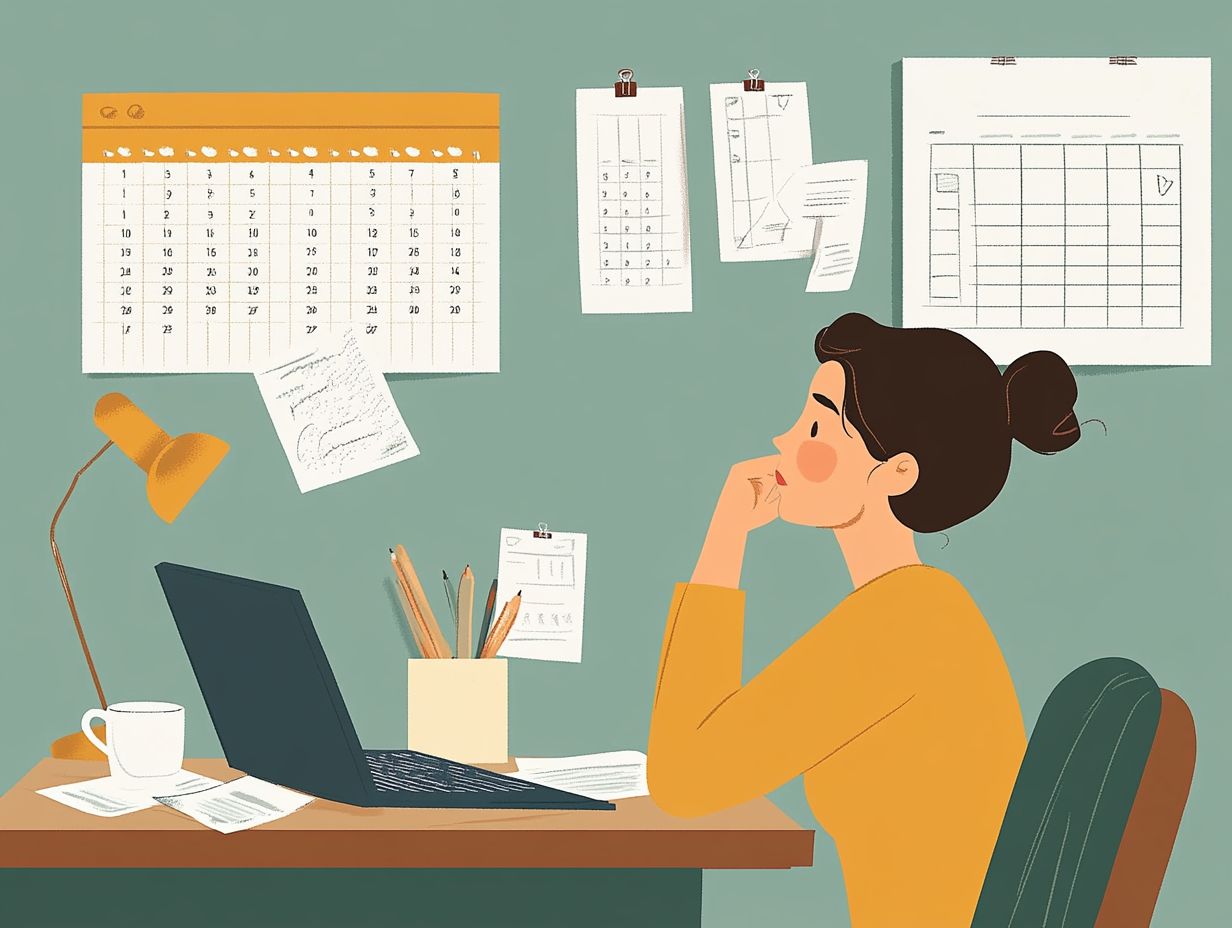
What to Do If You Have No Credit History?
If you have no credit history, there are a few steps you can take to start building credit:
- Apply for a secured credit card: This type of credit card requires a deposit, which becomes your credit limit. By using and paying off the card responsibly, you can start establishing a positive credit history.
- Get added as an authorized user: If a family member or friend has a credit card, they can add you as an authorized user. This allows you to use the card and build credit without being responsible for payments.
- Take out a credit builder loan: These loans are specifically designed to help people build credit. You make small monthly payments, and at the end of the loan term, you receive the full amount of the loan.
Start today and take charge of your financial future!
Why is Having No Credit History a Problem?
Having no credit history can make it difficult to get approved for loans, credit cards, or even an apartment rental. Lenders and landlords rely on credit history to determine your creditworthiness and ability to make payments on time.
Can I still get approved for a credit card if I have no credit history?
Yes! You can get approved for a credit card without any credit history. You might need to consider a secured credit card, which requires a cash deposit, or apply for a card aimed at first-time users.
Is it important to check my credit report if I have no credit history?
Absolutely! Checking your credit report is essential, even without any credit history. This helps you catch errors or fraud early on.
You also have a chance to monitor your credit and see how your efforts are paying off.
How long does it take to build credit if I have no credit history?
Building credit is a journey. Don t expect an excellent score overnight.
With responsible use, you may see improvements in your credit score in just 6 to 12 months.
What mistakes should I avoid when trying to build credit with no credit history?
Avoid common pitfalls like maxing out credit cards or missing payments. These mistakes can hurt your score and hinder future credit building.
Also, applying for too many credit accounts at once can be detrimental.



